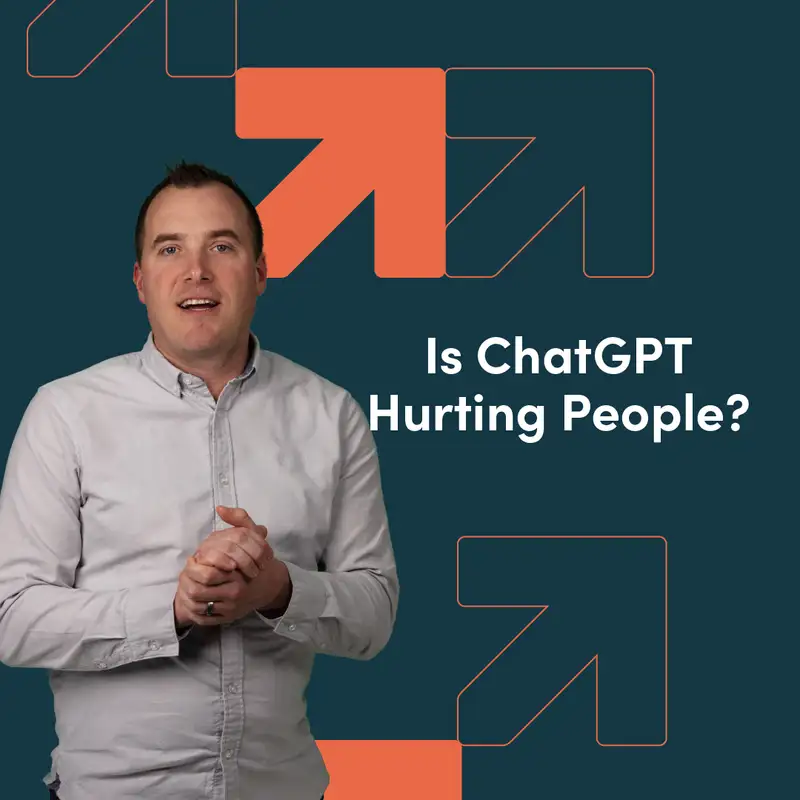Is ChatGPT Hurting People?
Hello, everyone. Thanks for listening to Wake Up, Look Up, a podcast where we connect events happening in real time to the gospel of Jesus Christ.
I'm Zach Weihrauch. And in today's episode, we're asking the question, is ChatGPT hurting people? This is based on an article I read recently in the Wall Street Journal.
Look, ChatGPT is one version of artificial intelligence. It's maybe the most popular one, the most accessible one. You can get an app on your phone. useful for a whole variety of things, but maybe dangerous for some of the most vulnerable people in our society.
The article I read focused on the story of Jacob Irwin, a 30-year-old man with autism whose use of ChatGPT actually landed him in a mental institution, at least temporarily.
It sent him on a downward spiral. ChatGPT picked up on emotional signs of distress. but actually pulled him further into some of his delusions of grandeur about who he is and what he could accomplish.
And when Erwin's life took a negative turn, his mother engaged the bot to kind of unravel what had happened and found that ChatGBT actually admitted it had failed to provide stabilizing reality checks and instead said, blurred the lines between role play and reality.
In other words, ChatGBT made a decision to participate in the delusions of Erwin without sounding any warning or even saying that it was playing a particular role.
Now, experts are saying that cases like this actually hit upon the fact that AI can exploit emotional vulnerabilities as people begin to trust bots, especially those who are dealing with a mental or emotional issue who may not be best equipped to determine the difference between ChatGPT as a tool or a toy versus an actual person.
Even OpenAI, the company behind ChatGPT, has acknowledged there are risks and they're working on improvements, but sometimes user experience outpaces their improvements.
So what's the overall point here? Well, I think it is that we need to continue to be careful with the way we use artificial intelligence.
Look, it's the future. There's no denying that. We are headed in that direction. As I've said before, the church often opposes technological progress and then ends up a decade behind actually bringing the gospel to bear on it.
I don't think that's the path forward. AI is the future and the present. but we should think constructively as Christians on how we deal with it.
And I'll just start with this. I believe that God has called the church in the scriptures to defend the weak and vulnerable.
Isaiah 1.17 says to seek justice, correct oppression, bring justice to the fatherless. So we, above all other groups of people, must be asking the question, how do we safeguard mentally and emotionally challenged people in their use of artificial intelligence, whether that's in supervision, whether that's in conversation, ultimately down the road, that might even be in legislation.
Christians have to continue to ask the question, but what about the vulnerable? How will this impact them? AI can't just be about making our lives easier or making our profit line a little stronger.
We have to keep in mind that every advancement could potentially come at the cost of people who really cannot afford it.
The second thing is this, that truth has to be anchored in reality, not an emotional experience. We have to continue to help vulnerable people and really all people distinguish between the real world and the digital world, between the value of real human voices and artificial intelligence.
Proverbs 14, 12 reminds us there's a way that seems right to man, but its end is death. running full tilt towards artificial intelligence without valuing human interaction is one of those ways that ultimately will lead to our destruction.
We can't forget that people need shepherding, not simulations. Ezekiel 34.2 says that should not shepherds care for the flock, whether that's fathers, mothers, educators, coaches, pastors, friends, we have to pay attention.
to the online engagement, the digital interaction of our friends and family. I have a 17-year-old son who knows more about artificial intelligence than I ever will.
I'm not trying to keep up with him or even stop him, but we are talking constantly about what he's using AI to do, about the conversations he's having, and whether or not he's building human relationships with equal enthusiasm.
That's because my son doesn't need to live in a under a rock and deny the reality of artificial intelligence, but he also doesn't need to engage in it without the shepherding of a father.
The other thing is this, flattery can be a form of deception. Psalm 12.2 says this, they speak with flattering lips and a double heart.
Listen, I'm worried about chat GPT in this way. I have found it to be overly affirming. I have to tell it to challenge me in something that I say.
Look, we are all prideful people. We're insecure people. We gravitate towards voices that tell us how great we are. My fear is that if our best friend becomes a digital app that never disagrees with us, we might not become the best versions of ourselves.
Jacob Irwin needed a real-life person to challenge some of the things he believed for his own mental and emotional health, and so do you.
Is ChatGPT a problem? No, not necessarily, unless we're using it unwisely. Of course, as usual, the problem lies in my heart and in yours.
Let's make sure we're looking to God to guide our hearts and not a digital apparatus. Hey, thanks for watching this episode of Wake Up, Look Up. If you enjoyed it, please help us get the word out by sharing it with someone you think might benefit from it. And while you're here, make sure to subscribe to our YouTube channel to get further content or even download the CCC app where you'll find even more resources to help you grow in your faith and relationship with Jesus Christ.
This episode of Wake Up, Look Up was produced by Marcus Cunningham and Holly Andrews.
Our topic researcher is Shanna Young. This episode was directed by Rima Saleh. Our podcast coordinator is Hallie Andrews. Our production manager and audio wizard is Marcus Cunningham with tech and engineering support from Matthew Adel and Landon Hall.
I'm your host, Zach Weihrauch. Join us for the next episode of Wake Up, Look Up.
Creators and Guests


